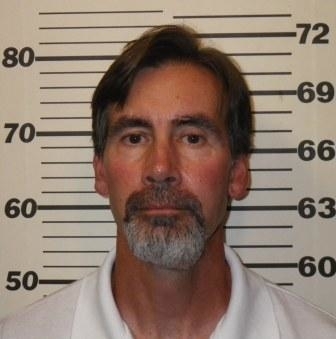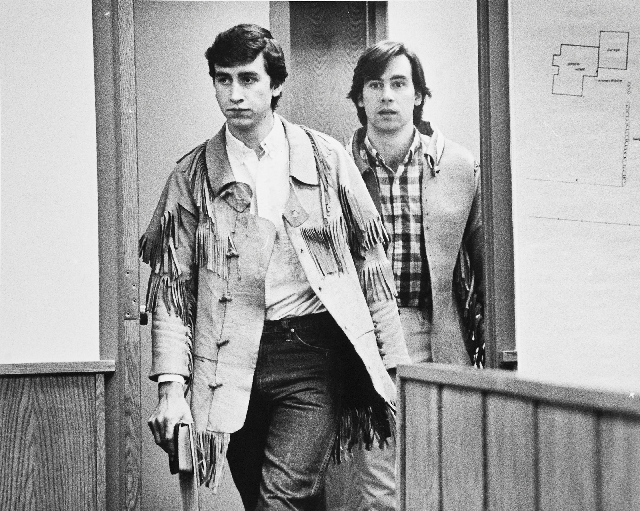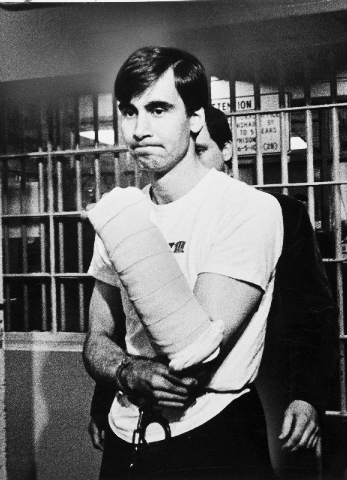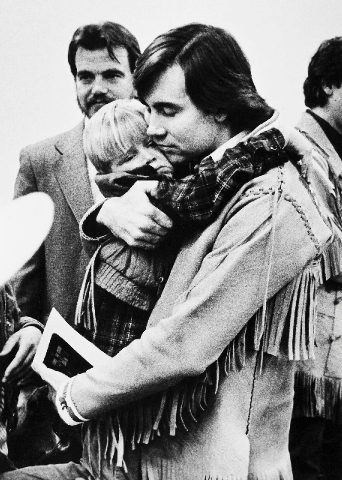Leader of 13-day standoff at polygamist compound is freed
SALT LAKE CITY — A man who bombed a Mormon church building in 1988 and sparked a 13-day standoff at a polygamist compound that left a corrections officer dead was released from prison on Tuesday after more than 25 years behind bars.Addam Swapp, 52, was accompanied by family members as he left Sanpete County Jail three months after members of the state board of pardons and parole approved his release, saying he had shown remorse for leading the standoff in Marion.
At his September parole hearing, Swapp apologized and said he planned to join his wife Charlotte and wanted to use his freedom to live peacefully and “be a blessing to my fellow man.”
“I desire when I get out of prison to live my life in such a manner that my family, friends, neighbors and community would find my presence in their lives a benefit and a blessing,” Swapp said in a written statement, according to a transcript of the hearing posted online by The Salt Lake Tribune.
Swapp said he was a different man after serving time in state and federal prisons for manslaughter, attempted murder, possessing a bomb and other offenses.
“My core beliefs have completely changed,” he said. “I am completely opposed to the violent acts I committed which got me sent to prison.”
Ann House, the widow of the slain officer, Lt. Fred House, said Tuesday that she believes Swapp has had time to consider his actions, according to a statement obtained by The Deseret News.
“There has been much suffering by both of our families in the past years,” she wrote. “Addam deserves a chance to reverse the damage done by doing good and now being an asset to his family.”
The standoff began after Swapp detonated 87 sticks of dynamite at a Mormon church building in Kamas on Jan. 16, 1988. Swapp claimed it would lead to the overthrow of The Church of Jesus Christ of Latter-day Saints and resurrect his father-in-law, John Singer, who was killed by police at the Marion compound in 1979.
Authorities said Singer was fatally shot when he pointed a gun at officers trying to arrest him over his refusal to send his children to public schools. Singer, 48, was a practicing polygamist and blamed the LDS church for his legal problems after he was excommunicated.
Swapp claimed he had a revelation that Singer would return to life on the ninth anniversary of his death, which was barely two weeks away.
Swapp, who went on to marry two of Singer’s daughters, holed up in Singer’s compound following the bombing. Nine children were among the 14 people barricaded with him in a log cabin. More than 100 officers surrounded the property after following tracks in the snow.
Throughout the standoff, officers flashed bright lights and circled in noisy snowmobiles in the middle of the night to psychologically weaken members of the Singer-Swapp clan. They resisted by shooting out police floodlights and used a lantern and mirrors to flash a crude Morse code message, “Cops not telling truth.”
Shortly after dawn on Jan. 28, 1988, the showdown ended in a gun battle.
Fred House, a dog handler with the state corrections department, was killed after he was struck by a bullet between armored plates in his flak jacket. House was shot by Singer’s son, John T. Singer, who was released from prison in 2006 after serving time on state and federal charges that included manslaughter and attempted murder.
Swapp was shot in the arm and chest during the shootout and waved a white towel through the doorway to surrender. The shootout was later recounted in a made-for-TV movie.
During court appearances, Swapp donned a buckskin coat fashioned by his wives that featured Indian signs, geometric symbols and a flag designed by his deceased father-in-law. He told the Salt Lake Tribune at the time that he believed God had chosen him to gather American Indians for the second coming of Christ. John Singer, he said, would be resurrected and unite lost tribes of Israel.
Swapp served 17 years in federal prison before beginning a state sentence in 2006. Officials opted to house him in Arizona rather than Utah because of his ties to a state officer’s death.
At his parole hearing in September, Swapp wept and issued a long apology, including statements directed at the House family, the Tribune reported. Swapp said it had been a long, slow process to shift from what he called wrongful beliefs to Christ-centered beliefs.
“The end result is that I have come away with a complete change of heart and a radically new way of looking at life,” he said.


























